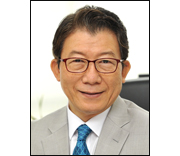-
[April 12. 2016 Korea times] 'Hope manufacturers' wanted
- Date : 2016.04.18
- Views : 441
'Hope manufacturers' wanted
 |
By Jeffrey I. Kim
Almost the entire world is suffering low growth and high unemployment. The political leaders seriously worry about the non-declining trend of high unemployment, especially youth unemployment. In 2015 Spain had the worst youth unemployment problem at 49.9 %, while Britain is below the EU average of 15.7 % and Germany at the bottom level of 7.2 %. To name a few more, they are Greece 49.7%, Italy 42.7 %, and France 24.5%.
Korea is not an exception. Its youth unemployment rate soared to an all-time record 12.5% in February 2016, up 1.4% year-on-year. This figure represents that roughly 560,000 15-29 year olds remained unemployed after college graduation. Although this number is somewhat below the EU average, Korean people feel much more frustrated than Europeans because they seem to have less hope about the future economy of their economy. Compared to other major countries, however, Korea has been doing better and Korean investors should have more confidence in their economy.
To reduce the unemployment rate, the following measures have been suggested: (1) make the labor market flexible and its information be readily available, (2) provide more channels through which job seekers and labor seekers can meet each other, and (3) provide training centers where job seekers obtain the knowledge and skills the companies need.
One critical factor that impedes the creation of new jobs is the lack of investor confidence in the future of the economy. Their pessimistic view is self-fulfilling. The businessmen with the expectation of a weaker future economy tend to invest less now. Then this leads to less production, less income, and less consumption, which in turn leads to less investment again. To help increase new jobs, this self-fulfilling cycle must be stopped.
Unfortunately, cases of self-fulfilling or self-defeating expectations are numerous. For example, peoples' expectations of future inflation lead them to spend more today and demand higher nominal interest rates for their savings because they expect that prices will be rising. This demand for higher interest rates and increased spending in the present, in turn create inflationary pressure and can cause inflation now even if expectations of future inflation are groundless. So the key to breaking the path of self-fulfilling is to correct the wrong assumptions on which the original expectations were based.
The trend of a low growth is sustained by peoples' self-fulfilling expectations of global and domestic recessions. This is equivalent to the "bank run effect". A bank run occurs when customers start taking their money out of a bank because they are afraid their money is not secure. This fear spreads and other customers also start wondering whether they might lose their money, panic ensues and masses of account holders withdraw their funds. Although a bank run is usually the result of panic and its snowball effect, instead of a true insolvency, the psychological factor must not be ignored. Likewise, a pessimistic expectation of global economy by one country can quickly spread to neighboring countries and global investors start reducing their investments. In this way global recession is self- fulfilled.
Under these circumstances, the world economy needs not only aggressive investors and manufacturers but also hope-manufacturers as well. Prominent scholars and respected teachers of individual countries can play that role. They can change peoples' beliefs, values, and attitudes in their society by correctly explaining the current situation and make a positive projection of the global economy based on the assumptions of implementation of the right policies. If they publicly point out the fact that the peoples' expectations of global recession and high unemployment are not correct because their expectations are based on the false assumptions, then people may correct their initial assumptions and change their behavior.
In addition, policy analysts and senior economists of the international organizations such as the IMF, the World Bank, and the World Trade Organization can play a greater role in changing the mindset of the opinion leaders of the member countries and, in turn, affect the behavior of businessmen including international investors. In this connection, the political leaders of the G20 need to play the expected role as we do need hope-manufacturers more than any other time in the past. With more hope-makers playing their role, more jobs can be created.
Jeffrey I. Kim is a foreign investment ombudsman, a presidentially appointed troubleshooter for investors and entrepreneurs from overseas. He earned a Ph.D. in economics at the University of Chicago and taught at the University of Colorado, Boulder, and Sungkyunkwan University.
Link : http://koreatimes.co.kr/www/news/opinon/2016/04/137_202344.html










